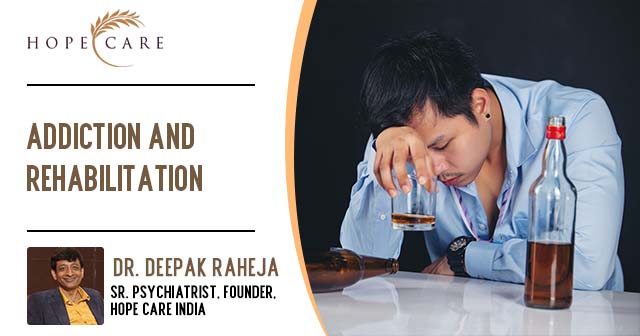Addiction is a devastating illness that causes unmanage ability and distress in the patient’s life. It is progressive, if not treated along with being powerful, baffling and cunning. Paradoxically, the identified patient, operates from a rigid denial system that does not allow him/her to see reality and the fact that a lot more is being taken by the illness as compared to being given.
Drugs and Alcohol Addiction is basically defined as the need to use any psychotropic substance to alter one’s mood. This need in turn is caused because of the patient’s inability to face reality for what it is. In an attempt, then, to bend and twist reality according to something that is more pleasing and less painful, the patient resorts to a quick / instant methods of anesthiasing himself/herself by the act of using alcohol or drugs.
A shift in attitude and thinking in due course of time causes significant changes in behavior in the patient. There is such a stark change in his personality that family members are left puzzled about the change that is evident. The patient may go on to make promises and excuses that the family shall patiently weigh out, hoping for a miracle. For the family the main culprit is the substance and they too get into the momentum of bargaining with the patient. For example, agreeing upon the number of drinks, drinking only at home or drinking/using thrice a week etc. But this lasts only till all chaos and hell breaks out. Reason being that an alcoholic can never turn into a social drinker. From being extremely ego centric to controlling, as the illness progresses and the intake of substance increases, the patient becomes very difficult for other people to relate to. This causes a strain in interpersonal relationships with social and occupational difficulties. At the threshold of addiction is a significant variable that fuels the illness, known as “Spiritual Bankruptcy”. This a complete reversal of the value system inculcated in the patient since childhood which makes him/her lose a connect with the inner self and leads to extremity- in thinking, in feeling and behavior. This extremity which has been semi operative so far; when exposed to the substance takes on an explosive, volcanic form which leads to “dysfunctional choices” that are made by the patient, which leave the family and friends traumatized, disappointed and also at times angry; at later stages worried.
It is at this stage of worry that the inexcusable behavior of the patient is for the first time thought of as a disease and not just defined as “a bad habit”. From the above understanding of addiction it is very clear then that the problem is not just the substance but is more of an attitudinal/personality issue. It is the lens with which the patient views life in general that is distorted.
Getting rid of this affliction is a process in itself and is not about the patient’s will power. It is about delving deep into the recesses of the patient’s mind and identifying the core symptoms within him/her that are fuelling the addiction. Treatment for addiction is accessible and revolves around creating not only abstinence but functioning holistically on the patient’s personality and thinking. Depending upon the severity of the symptoms, duration of the illness and the associated unmanageability and distress, a recommendation is made by a psychiatrist to begin treatment on an out patient basis or cases that require more intensive work up are recommended admission and treatment at a Rehabilitation centre. It is important to note that all addiction related problems do not require rehabilitation though they may require professional help and guidance to battle the illness.
Hope Care India – Institute of De-Addiction is a treatment and rehabilitation center that is safe, secured and a residential axis that helps the patient in creating a geographical distance between him and the substance, the first stepping stone of treatment. Being away from external distractions helps the patient focus within and sets the foundation for intensive therapeutic sessions to begin. Contrary to myths about rehabilitation centers, Hope Care India, works with a philosophy of treating all patients with the utmost dignity and respect. A nurturing, compassionate environment is engineered that sets the pace for healing to begin. Differing from the viewpoint that an addict must be taught a lesson , the licensed professionals at Hope Care India , believe in operating from clinical logic and practice that they have acquired over years of training and experience. As opposed to the Out-patient services, In-patient treatment allows for extensive monitoring and supervision that helps the treating team chart the patient’s progress on a day to day basis and get a better understanding of the internal factors that maintain addiction. Detoxification, Cognitive behavioral therapy and intensive family therapy sessions help the patient regain his lost confidence and functionality.
Dr. Deepak Raheja
Sr. Psychiatrist and Psychotherapist
President – Delhi Psychiatric Society
Director – Hope Care India
137, Uday Park,
New Delhi – 110049
Ph.: +91-98102 12377
Website: – www.hopecareindia.com

Hope Care established under the guidance of Dr. Deepak Raheja, is a Psychiatric Centre of excellence that endeavors to restore hope and well-being to individuals and families afflicted by mental ill-health through comprehensive treatment and rehabilitation services. Hopecare seeks to set benchmarks in innovative programs in treatment, care, and education.

